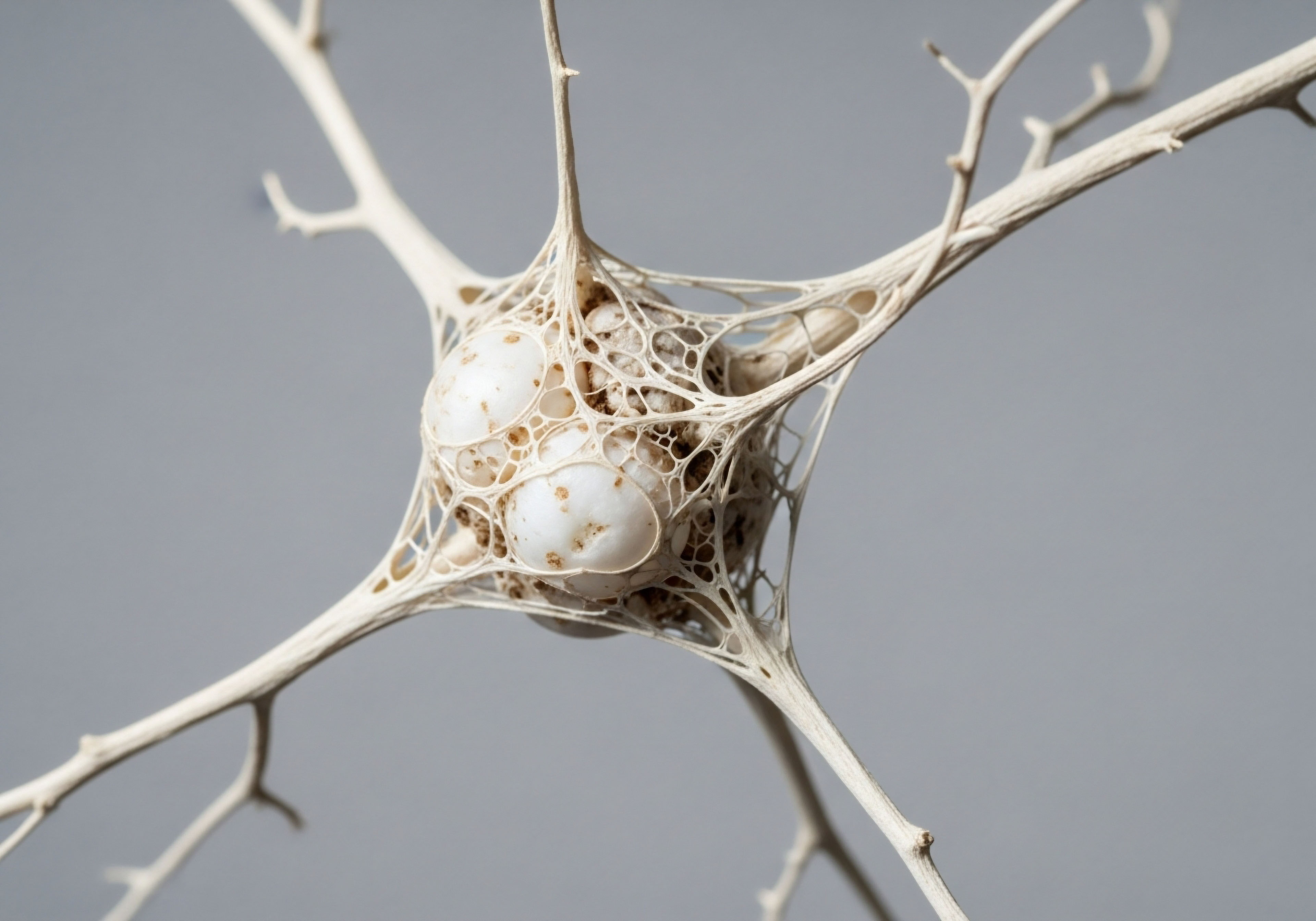

The Neurological Renaissance Why Your Brain Demands Recalibration
The human brain, a marvel of biological engineering, operates at the zenith of its potential when its intricate systems are precisely calibrated. We exist in an era where understanding the underlying mechanisms of cognitive function is no longer a pursuit for the few, but a mandate for anyone aspiring to operate at peak performance.
The notion that cognitive decline is an inevitable consequence of aging is a narrative we actively dismantle. Instead, we frame it as a system that, much like any high-performance engine, requires meticulous tuning and strategic upgrades to maintain and enhance its output. The imperative to recalibrate your brain stems from a fundamental understanding of neurobiology and endocrinology ∞ these are not separate domains, but deeply interconnected pillars supporting mental acuity, drive, and enduring vitality.
At the core of this recalibration lies the intricate interplay between hormonal balance, metabolic health, and neural function. Hormones such as testosterone, thyroid hormones, and even growth hormone act as master regulators, influencing neurotransmitter synthesis, neuronal growth, and synaptic plasticity. When these endocrine signals are suboptimal, the brain’s capacity for focus, memory recall, and executive function diminishes.
This is not a matter of opinion; it is a direct consequence of biological feedback loops and cellular signaling pathways. The brain is a bio-energetic powerhouse, and its optimal functioning is inextricably linked to how efficiently it processes fuel and manages oxidative stress.
Consider the Hypothalamic-Pituitary-Gonadal (HPG) axis. A dysregulated HPG axis, often manifesting as low testosterone in men or estrogen/progesterone imbalances in women, does not merely affect reproductive health or mood; it directly impacts cognitive function. Studies consistently link adequate testosterone levels to improved spatial memory, verbal fluency, and overall executive function.
Similarly, optimal thyroid hormone levels are critical for maintaining cognitive processing speed and alertness. Ignoring these foundational hormonal signals is akin to neglecting the engine control unit in a performance vehicle ∞ the result is reduced power, efficiency, and responsiveness.
Metabolic health is the second critical lever. The brain derives its energy primarily from glucose, but its efficiency is profoundly influenced by insulin sensitivity and the availability of alternative fuel sources like ketones. Conditions such as insulin resistance, prediabetes, and dyslipidemia create an inflammatory environment that is detrimental to neuronal health.
This chronic inflammation impairs blood-brain barrier integrity, reduces neurotrophic factor production, and accelerates cellular senescence. Therefore, achieving peak cognitive performance necessitates a metabolic state characterized by stable blood sugar, efficient fat utilization, and minimal systemic inflammation.
The current paradigm often treats cognitive symptoms ∞ brain fog, fatigue, lack of motivation ∞ as isolated issues. The Vitality Architect perspective views these as data points, signaling a need for a systemic intervention. We are not merely treating symptoms; we are engineering the underlying biological architecture to support sustained high-level cognitive output. This approach recognizes that true peak performance is not a fleeting state but a consistently accessible operating mode, achieved through intelligent, data-driven self-management.
This recalibration is an active process, an upgrade to your biological operating system. It moves beyond passive health management to proactive biological optimization. The science is clear ∞ by understanding and intervening in these core biological systems, you can unlock cognitive capabilities previously thought unattainable. This is the genesis of the neurological renaissance ∞ a movement to engineer superior mental performance through a deep understanding of our own biology.

The HPG Axis and Cognitive Drive
The intricate feedback loop of the Hypothalamic-Pituitary-Gonadal axis is a primary driver of mood, motivation, and cognitive function. When this axis operates with optimal hormonal signaling, individuals experience enhanced drive, sharper focus, and improved executive function. This endocrine symphony is not merely about reproduction; it is fundamental to the architecture of a high-performing mind.

Metabolic Agility Fuels Neural Power
The brain’s demand for energy is immense, and its ability to efficiently utilize available fuel sources, particularly glucose and ketones, dictates its performance envelope. Metabolic dysfunction, characterized by insulin resistance and chronic inflammation, directly impedes neural efficiency and accelerates cognitive aging. Achieving metabolic agility is therefore a non-negotiable prerequisite for unlocking sustained cognitive excellence.
“Low testosterone is directly correlated with diminished executive function, spatial memory deficits, and reduced verbal fluency. This is not a secondary effect; it is a primary determinant of cognitive capacity.”


Biochemical Architecture for Peak Mental Output
Engineering peak cognitive performance requires a precision-guided approach, leveraging a suite of evidence-based interventions that address the core biological drivers of brain function. This is not about generic wellness advice; it is about applying the principles of systems engineering to your own physiology. The strategies employed are rooted in rigorous scientific inquiry, focusing on hormonal optimization, advanced peptide signaling, metabolic recalibration, and targeted neuro-enhancement.

Hormonal Equilibrium as the Foundation
The bedrock of cognitive function is hormonal balance. Restoring and optimizing key hormones creates the necessary internal environment for neural systems to thrive.

Testosterone Optimization
For men, achieving supra-physiological or optimal physiological levels of testosterone is paramount. This involves not just addressing deficiency but strategically optimizing within a performance-oriented range. Testosterone’s influence extends beyond muscle mass to neuroprotection, neurotransmitter regulation (especially dopamine and serotonin), and the promotion of neurogenesis. Testosterone undecanoate or cypionate, administered via injection or intramuscular depot, are clinical standards for sustained, effective levels. Regular biomarker monitoring ensures therapeutic efficacy and safety.

Thyroid Hormone Regulation
Thyroid hormones are indispensable for maintaining metabolic rate and cognitive processing speed. Suboptimal levels, even within the “normal” lab range, can manifest as sluggish thinking, poor concentration, and fatigue. A comprehensive thyroid panel, including TSH, Free T4, Free T3, and antibodies, is essential. Targeted thyroid support, using desiccated thyroid extract or synthetic hormones like levothyroxine, may be indicated based on clinical presentation and laboratory findings, always under expert supervision.

Growth Hormone and IGF-1 Axis
The growth hormone (GH) and Insulin-like Growth Factor 1 (IGF-1) axis plays a significant role in neuroplasticity, cognitive function, and tissue repair. While direct GH administration requires careful medical oversight due to potential side effects, strategies to naturally stimulate GH secretion or maintain optimal IGF-1 levels, such as through specific peptide therapies or targeted exercise protocols, can be highly beneficial.

Peptide Signaling for Targeted Neural Enhancement
Peptides are short chains of amino acids that act as signaling molecules, modulating a vast array of biological processes. In the context of cognitive performance, specific peptides offer precise mechanisms to enhance neuroprotection, promote synaptic function, and improve energy metabolism within the brain.

Semorelin and Ipamorelin
These peptides are known for their ability to stimulate the pituitary gland to release growth hormone. This leads to a cascade of benefits, including increased IGF-1 production, which supports neurogenesis, enhances synaptic plasticity, and improves mitochondrial function in neurons. Their use can combat age-related cognitive decline and boost overall brain vitality.

Cerebrolysin
A neuropeptide mixture derived from animal brain proteins, Cerebrolysin has demonstrated neuroprotective and neurotrophic effects. It can enhance cognitive function, improve memory, and aid in recovery from neurological insult by promoting neuronal survival, differentiation, and synaptic transmission.

Noopept
While often categorized as a nootropic, Noopept is a peptide derivative that has shown significant promise in enhancing learning and memory, improving focus, and offering neuroprotective benefits. It acts on multiple neurotransmitter systems and can promote neurotrophic factors.

Metabolic Recalibration for Optimal Brain Fuel
The brain’s energy supply chain is critical. Optimizing metabolic pathways ensures a stable, efficient energy source, free from the damaging effects of inflammation and oxidative stress.

Nutritional Ketogenics and Targeted Macronutrient Manipulation
Adopting a ketogenic diet or utilizing targeted ketogenic diets (TKD) can shift the brain’s primary fuel source from glucose to ketones. Ketones are a more efficient and cleaner fuel for the brain, reducing oxidative stress and providing neuroprotection. This metabolic shift also dampens inflammation and improves insulin sensitivity.

Intermittent Fasting Protocols
Time-restricted feeding (TRF) and various intermittent fasting (IF) protocols, such as the 16/8 method or alternate-day fasting, trigger cellular repair processes like autophagy, enhance insulin sensitivity, and promote the production of brain-derived neurotrophic factor (BDNF), a key molecule for neuronal growth and survival.

Blood Sugar Stabilization
Maintaining stable blood glucose levels is non-negotiable. This involves careful carbohydrate selection, consistent meal timing, and, where necessary, pharmaceutical interventions to prevent glycation and the damaging downstream effects of hyperglycemia on neural tissue.

Targeted Neuro-Enhancement Modalities
Beyond internal biochemical adjustments, external modalities can further refine neural performance.

Optimized Sleep Architecture
Sleep is not a passive state but an active period of neural consolidation, detoxification, and repair. Achieving deep, restorative sleep stages (NREM Stage 3 and REM) is critical. This involves meticulous sleep hygiene, light management, and potentially the use of sleep-promoting supplements or therapies like low-level laser therapy.

Strategic Supplementation
Certain supplements provide essential co-factors for neurotransmitter synthesis, mitochondrial function, and antioxidant defense. These include Omega-3 fatty acids (EPA/DHA), specific B vitamins, magnesium, N-acetylcysteine (NAC), and alpha-lipoic acid.
The integration of these elements ∞ hormonal optimization, peptide signaling, metabolic recalibration, and targeted neuro-enhancement ∞ forms the comprehensive framework for biochemical architecture. This systematic approach ensures that every facet of your biological system is aligned to support superior cognitive function and enduring peak performance.
| Intervention Category | Specific Modality | Primary Mechanism | Cognitive Benefit |
|---|---|---|---|
| Hormonal Optimization | Testosterone Therapy | Neurotransmitter balance, neurogenesis | Improved memory, focus, drive |
| Thyroid Hormone Support | Metabolic rate, processing speed | Enhanced alertness, cognitive clarity | |
| Peptide Signaling | Semorelin/Ipamorelin | GH/IGF-1 axis, neurotrophic factors | Neuroplasticity, cognitive repair |
| Noopept | Neurotransmitter modulation, BDNF | Enhanced learning, memory, focus | |
| Metabolic Recalibration | Nutritional Ketogenics | Alternative fuel source, reduced inflammation | Sustained energy, neuroprotection |
| Intermittent Fasting | Autophagy, BDNF increase | Cognitive resilience, cellular repair | |
| Blood Sugar Stabilization | Prevent glycation, reduce oxidative stress | Long-term neural health, consistent energy | |
| Neuro-Enhancement | Sleep Optimization | Neural consolidation, detoxification | Memory consolidation, cognitive restoration |
| Strategic Supplementation | Mitochondrial support, antioxidant defense | Enhanced neural efficiency, resilience |


The Rhythmic Calibration of Cognitive Systems
Achieving and sustaining peak cognitive performance is not a singular event but a continuous process of rhythmic calibration. Understanding when to implement specific interventions, the expected timelines for biological adaptation, and the cyclical nature of optimization is as critical as the interventions themselves. This temporal strategy ensures that your biological systems are consistently operating within their optimal parameters, preventing stagnation and maximizing long-term gains.

Establishing the Baseline ∞ The Initial Assessment
The journey to recalibrated cognition begins with a comprehensive baseline assessment. This involves detailed biomarker analysis ∞ including comprehensive hormone panels, metabolic markers (HbA1c, lipid profiles, inflammatory markers), and potentially neurocognitive assessments. This initial phase, typically spanning one to two weeks, provides the critical data points to inform the subsequent strategic deployment of interventions. It answers the fundamental question ∞ “Where are we starting from?”

Immediate Actions ∞ Foundational Shifts
Upon completion of the baseline assessment, immediate foundational shifts are implemented. These are often lifestyle-based interventions that can yield rapid improvements in subjective well-being and objective markers.
- Sleep Optimization: Implementing rigorous sleep hygiene protocols ∞ consistent sleep schedules, light exposure management, and environmental optimization ∞ can yield noticeable improvements in alertness and cognitive clarity within days.
- Metabolic Stabilization: Adjusting macronutrient ratios, implementing intermittent fasting protocols, and eliminating pro-inflammatory foods can begin to recalibrate blood sugar and reduce systemic inflammation within one to two weeks.
- Hydration and Electrolyte Balance: Ensuring optimal hydration and electrolyte balance is a simple yet potent intervention that can acutely improve cognitive function and reduce fatigue.

Phase One ∞ Hormonal Rebalancing (weeks 2-12)
This phase focuses on addressing significant hormonal imbalances identified in the baseline assessment.

Hormone Replacement Therapy (HRT) Initiation
If HRT is indicated (e.g. testosterone, thyroid support), initiation typically occurs within the first two weeks. The initial period (weeks 2-6) is crucial for monitoring adaptation and adjusting dosages. Subjective improvements in energy, mood, and focus may be noticed within this timeframe. Objective improvements in cognitive function typically become more pronounced between weeks 6 and 12 as physiological levels stabilize and tissues respond.

Peptide Therapy Introduction
Introduction of peptides like Semorelin or Noopept often begins in tandem with HRT initiation or shortly thereafter. The timeline for peptide efficacy varies. Semorelin’s effects on GH/IGF-1 may take 4-8 weeks to manifest fully in terms of tissue regeneration and metabolic changes. Noopept can offer more immediate cognitive benefits, with noticeable improvements in focus and memory within days to weeks of consistent use.

Phase Two ∞ Metabolic Optimization and Neuroplasticity (months 3-6)
With hormonal systems stabilizing, the focus shifts to deeper metabolic recalibration and fostering neuroplasticity.

Advanced Metabolic Strategies
Refining ketogenic diets, implementing cyclical ketogenic diets (CKD), or fine-tuning intermittent fasting schedules becomes key. This phase aims to maximize fat adaptation, enhance mitochondrial efficiency, and further reduce inflammation. Measurable improvements in body composition, sustained energy levels, and cognitive resilience are typically observed during this period.

Targeted Supplementation and Lifestyle Integration
Introduction of advanced supplements, neurofeedback, or specific cognitive training programs occurs here. The goal is to leverage the optimized internal environment to drive further neuroplastic changes and solidify performance gains. Consistency is paramount; benefits accrue over months of diligent practice.

Ongoing Calibration ∞ The Perpetual Edge (month 6+)
Peak performance is not a destination but a dynamic state maintained through ongoing vigilance and strategic adjustments.

Regular Biomarker Monitoring
Bi-annual or quarterly biomarker assessments are essential to track progress, identify subtle shifts, and proactively adjust protocols. Hormonal levels, metabolic markers, and inflammatory indicators can fluctuate, requiring precise recalibration to maintain the optimal performance state.

Adaptation to Life’s Demands
Life presents unique challenges ∞ periods of high stress, travel, or altered sleep patterns. The ability to adapt your protocols to these demands, while minimizing performance deficits, is a hallmark of true biological mastery. This might involve temporary adjustments to diet, sleep schedules, or even specific peptide protocols.

Long-Term Trajectory
The ultimate goal is not just short-term cognitive enhancement but the establishment of a biological framework that supports sustained vitality and performance throughout the lifespan. This involves a deep understanding of longevity science and proactive aging strategies, ensuring that cognitive recalibration contributes to a longer, healthier, and more capable life. The timeline for experiencing significant, sustainable cognitive enhancement is typically measured in months, with foundational changes manifesting rapidly and deeper systemic optimizations requiring consistent application over a longer duration.
“The most significant cognitive enhancements are not achieved through isolated interventions, but through the synergistic timing and integration of hormonal, metabolic, and neural optimization strategies.”

Forging the Enduring Edge of Human Potential
The pursuit of peak cognitive performance is an expedition into the highest echelons of human capability. It transcends mere symptom management, delving into the intricate engineering of our biological systems. We have charted the imperative for recalibration, dissected the precise biochemical architectures for neural mastery, and defined the rhythmic cadence required for sustained optimization. This is not a passive journey; it is an active, data-driven commitment to becoming the architect of your own peak potential.
The science underpinning these strategies ∞ endocrinology, peptide signaling, metabolic science, and neurobiology ∞ provides an undeniable foundation. When these principles are applied with precision, the results are transformative. We move from a state of reactive health to proactive vitality, from functional limitation to engineered excellence. The brain, once perceived as a static entity susceptible to inevitable decline, is revealed as a dynamic, responsive system capable of profound adaptation and enhancement.
The Vitality Architect’s approach is one of informed empowerment. It demands a deep dive into your unique biological blueprint, a willingness to engage with cutting-edge science, and a commitment to consistent, intelligent action. The outcomes are not just enhanced cognitive function ∞ sharper focus, superior memory, accelerated learning ∞ but a fundamental upgrade in your capacity to engage with the world, to solve complex problems, and to live a life defined by drive, clarity, and enduring resilience.
This is the essence of recalibrating your brain ∞ mastering the internal chemistry and cellular signaling that dictate your mental output. It is about understanding that peak performance is not an accident of genetics, but a meticulously engineered state.
By embracing these principles, you step into a future where your biological potential is not a limitation, but your greatest asset, continuously refined and perpetually optimized. The journey is demanding, but the reward is the ultimate competitive advantage ∞ a brain operating at its absolute zenith, ready to conquer any challenge.

Glossary

cognitive function

peak performance

executive function

growth hormone

oxidative stress

peak cognitive performance

blood sugar

metabolic agility

metabolic recalibration

cognitive performance

mitochondrial function

intermittent fasting

peptide signaling

intermittent fasting protocols




